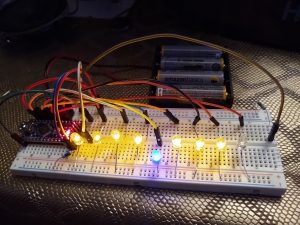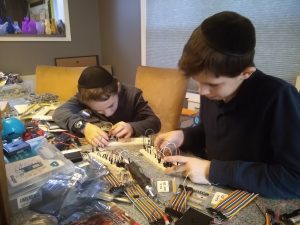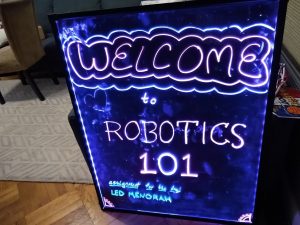
It’s like something straight out of a fairy tale.
But instead of announcing who is the fairest of all, the large mirror on the wall of Dovid Teitelbaum’s home offers a cornucopia of information including the current time in New York and Israel, the local weather forecast, and the whereabouts of each member of the Teitelbaum crew. Welcome to 2020, where smart mirrors are the dashboard of the home. The availability of low-cost computer chips makes it easy to put one together on a Sunday afternoon, something that makes Dovid a very happy camper.
Actually, camping is very much a part of Teitelbaum’s blood. He is the director of Camp Sdei Chemed, founded by his father, Rabbi Eli Teitelbaum, z”l, in 1969 to give teens a taste of Israel sweetened with a healthy dose of learning, chessed opportunities, and exciting activities. Dovid has also been using his talent for videography as director Video Productions for more than 20 years, and he has enjoyed teaching students at both Yeshiva Torah Temimah and Lev Bais Yaakov. And although STEM subjects – science, technology, engineering and mathematics – have become hugely popular in recent years, Teitelbaum’s passion for those areas of study stretches back not just years, but decades.
While it seems as if today’s kids are born tech savvy and most of us have been zooming our way through life over the past few months, the world was a very different place when Rabbi Eli Teitelbaum founded Dial A Daf in the early 1980s. An early adaptation of Torah-true technology, Dial A Daf was revolutionary, with hourly shiurim playing on tape recorders hooked up to dozens and dozens of phone lines in the basement of the Teitelbaum’s Boro Park home.

“I grew up while all this was happening, and I remember the phone company digging up the street to get all the phone lines in,” Dovid says. “My father had a passion for people and for technology, and when he saw that I liked computers he gave me my first computer as a kid, when practically no one had one, hiring someone to teach me.”
Like his father, Dovid loved to tinker with things, taking them apart and putting them back together, and he grew up fascinated by all things technological, choosing it as his major course of study in college. He ultimately made his way into the world of videography, his camera skills and ability to edit his own work putting him in head to head competition with the big boys, filling whatever time remained in his schedule with teaching computers and science while also juggling his responsibilities at Sdei Chemed.

Always eager to expand his horizons, Dovid bought a 3D printer kit from China seven years ago. The instructions were far from helpful as they were written in Chinese, but the Marine Park father of four turned to the internet for help and ultimately managed to put his printer together. Everyone he showed it to was both amazed and fascinated and after assembling several more, it was clear to Teitelbaum that with a few controllers and some plastic creating a 3D printer wasn’t exactly rocket science. That experience and a drone-building project introduced Dovid to the world of the Arduino board, whose programmable microcontroller and software make it easy for even novices to start dabbling in the world of robotics. Ever the enthusiast, he dove in headfirst and he began transforming his home on his own, using Arduinos and existing blocks of open source code to control a variety of devices, circumventing the need for Amazon’s Alexa and Google Assistant by building his own smart devices. Dovid found that he could use Arduinos to control his toaster oven, set his washer to let him know when a load of laundry had completed, and welcome family members when they came home, a specific song playing for each one when their cellular phones’ GPS was detected on premises. His favorite smart adaptation was a motorized window shade controller to raise the shades at sunrise every day and lower them each night as sunset fell and even the obvious Shabbos problem wasn’t a concern at all, with Teitelbaum using existing free code available to the public to prevent certain functions from running on Shabbos or Yom Tov.

But there is not doubt that the star of show is the wall mounted smart mirror. Built by Dovid and his 14 year old daughter Aliza, the mirror controls the many automated items in the family’s home using a device called Raspberry Pi, a credit card sized computer that retails for about $35 on Amazon.
“It is bigger than an Arduino and the smallest computer that they make,” said Dovid. “We built it together by putting a one way mirror, that you can see through like the mechitzas you find some times in shul, in front of an old flatscreen.”

Among the many items displayed on the smart mirror are a Harry Potteresque clock face, hands for each person indicating if they are home, at work, in school, lost of at other predetermined locations. Also showing are readouts from the open source Home Assistant program that tracks every connected device in the house and a family calendar and other useful data.
It would be an understatement to say that visitors to the Teitelbaum home were intrigued by the many high tech touches that seemed to be all around them, with more than a few saying they wished their children could learn how to construct similar devices in school. Those words sparked yet another proverbial lightning bolt for Teitelbaum who realized that there was yet another item he needed to create: a robotics club for kids.
It goes without saying that a hobby like Dovid’s is one that involves an ever-growing amount of gadgets, devices and other paraphernalia and he transformed his unused garage into a man cave/studio where he keeps his technology and “toys.” He began his first foray into robotics for kids this past fall with a group of sixth to eighth grade boys in the Five Towns, doing additional classes in Marine Park in his former garage. Each 10 to 15 person group met once a week for an hour, the boys getting hands on experience in robotics. For their first project, club members used Arduinos to construct obstacle avoidance cars whose built in sensors reversed the vehicles’ direction each time they collided with anything. When Chanukah rolled around, the club took a break from their cars to make a more seasonal project: LED menorahs.
“I showed them how to wire a menorah with flashing lights,” says Dovid. “They saw that it was the same chip that can do anything, it’s just a function of how you wire it and write the code. Robotics have become very inexpensive and kids can do just about anything they want with them.”
One of the reasons robotics has become so much more approachable is that knowing how to write code from scratch isn’t really necessary since so much code is available and free for the taking. Teitelbaum has his young charges working with existing blocks of open source code, manipulating a few lines here and there to produce the desired results but he appreciates that much like not every child is a musician or a star athlete, not every child is cut out for robotics.
“It has to be the kind of kid who enjoys building and computers,” explains Dovid. “In the beginning of the class you could see that the kids all wanted to be there, but not all of them felt that way at the end and there were a few kids who never picked up their completed projects. I could tell that for certain kids, what we were discussing was a little above their level.”
Dovid got positive feedback from multiple students while classes were ongoing, telling him that the robotics class was the highlight of their week. Equally enthusiastic messages from parents proclaimed their sons were engaged, excited, and learning, which was music to Teitelbaum’s ears. But best of all was the notion that not only does the robotics club provide him with an opportunity to indulge in a fun hobby and tinker to his heart’s content, but it also gives him the ability to continue learning and updating his own skills.
“I ask the kids all the time, what ideas do you have?” says Dovid. “Everything is becoming easier and easier to build, with a growing community of people helping out and making it cheaper and simpler to do.”
The coronavirus outbreak had Dovid shutting down his classes this past spring, but he looks forward to doing more clubs, for more ages. He would love to do robotics with high schoolers but appreciates that for boys at least, the day just isn’t long enough, with many coming home far too late at night from yeshivah to take on any optional activities. He has also had requests to do girls’ clubs, which hasn’t happened yet, although he has done small robotics projects at Lev Bais Yaakov during a special Friday class that met 10 times this past year.
“It was a lot of fun but it was hard to build a project like that,” says Dovid. “This is basically STEM, which is something that everyone is talking about. I try to explain to my students how this can help them in life and how many jobs involve some type of robotics which are a very big part of our future.”
Teitelbaum is a big believer in STEM, something he tries to incorporate as much as possible into his science classes at Torah Temimah and Lev Bais Yaakov. He isn’t afraid to say that he would have no problem eliminating one of the four main areas of secular study in favor of STEM and noted that it is understandable that most of today’s science and math teachers haven’t really had the opportunity to acquire the skills they need to teach this particular area of study.
“There is so much material and it is constantly changing and like all new things, it has to be done right,” observes Dovid. “How often does it happen that schools get 3D printers and they just sit? A lot of money can sometimes be invested in these kinds of materials, which is pointless without knowing how to use them properly.”
Teitelbaum is already teaching STEM in Lev Bais Yaakov, with the regular science teacher still present in the class and learning along with the students. Despite his passion for the subject, he recognizes that not every child will thrive in a STEM class.
“This isn’t necessarily for everyone so its important not to push kids who don’t have a thing for it,” says Dovid. “Instead, it makes more sense to teach it to the ones that do and who enjoy it.”
Having dabbled so much in the world of technology and seeing its rapid evolution from his childhood until today, Dovid is a firm believer that the uses and applications for STEM will continue to explode. It doesn’t even seem far fetched to say that while today Dovid’s smart home is unique, one day everyone will have one.
“There are so many ideas,” noted Teitelbaum. “It’s literally endless.”
Get Your Kids Excited About STEM
Piquing your children’s interest in STEM may seem like an uphill battle, but it doesn’t have to be. Kids don’t want to be burdened with extra schoolwork, so highlight the fun and practical sides of STEM.
Sandy Eller is a freelance writer who writes for numerous websites, newspapers, magazines and private clients. She can be contacted at sandyeller1@gmail.com.
You must be logged in to post a comment.